Accessible Smart Shower Interfaces: From Research to Expert-Validated Design
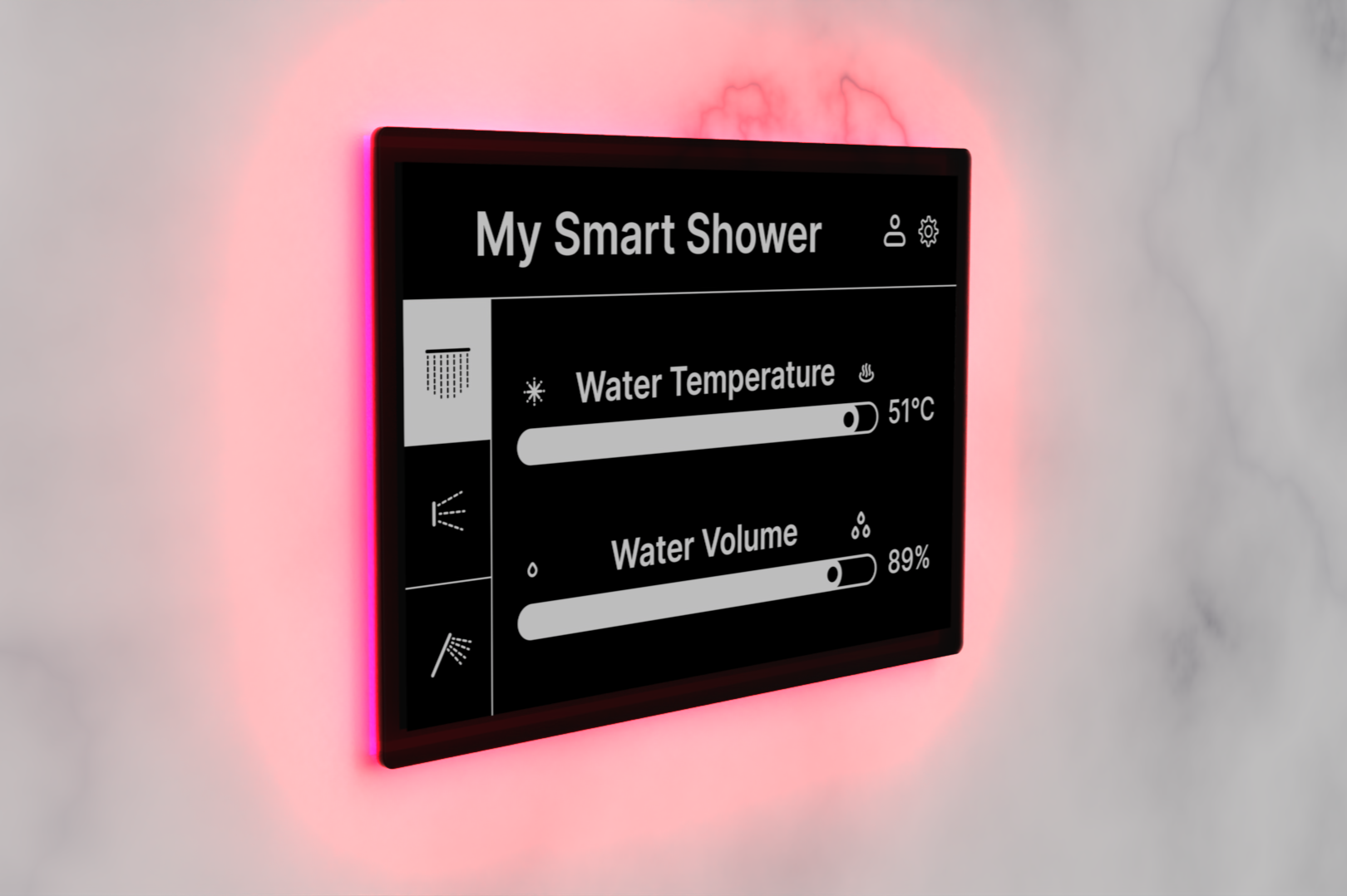
Designed and tested a touchscreen interface for smart shower systems that improved usability for older adults; achieving an 83% task completion rate and reducing errors by 17% compared to alternative controls. The final design guidelines were reviewed and endorsed by 5 industry experts, offering a scalable blueprint for inclusive smart home products.
- Role: UX Researcher
- Timeline: Jan – Sept 2025
- Location: Goldsmiths, University of London
- Tools: Figma · Miro . Solidworks . KeyShot . Arduino
Overview
As the global population ages, ensuring that smart technologies address the unique needs of older adults becomes increasingly essential. This project focuses on developing user-centered design guidelines for smart shower systems that improve accessibility, safety, and independence for senior users.
Research Objectives
The aim was to explore how multimodal interactions in smart shower systems (e.g., touchscreens, voice commands, and gesture controls) can enhance usability for older adults while addressing their physical and cognitive challenges.
Methodology: Mixed Methods Approach

Used a mixed-methods approach combining background research, qualitative content analysis, semi-structured interviews, and iterative prototyping. Each phase built on the last; uncovering accessibility barriers in existing smart showers, testing three interaction models with older adults, and refining designs through expert evaluation. This process produced measurable usability gains (83% task completion, 17% error rate) and actionable, expert-validated accessibility guidelines.
Background Research:
Reviewed six academic studies using qualitative content analysis to uncover physical and cognitive challenges older adults face when showering. These included:

These findings became the foundation for the interview questions and prototype concepts, ensuring that later design exploration directly addressed real, documented barriers from prior research.
● User Research
Participants:
- 25 total (14 female, 11 male), Aged 60–82
- Mix of independent & assisted living
- Varying familiarity with technology
- Recruited from community centres & caregiving networks
Interview Agenda:
- Current shower habits and setup
- Physical and cognitive challenges during use
- Opinions on smart shower controls (touch, gesture, voice)
- Suggestions for safer, more accessible designs
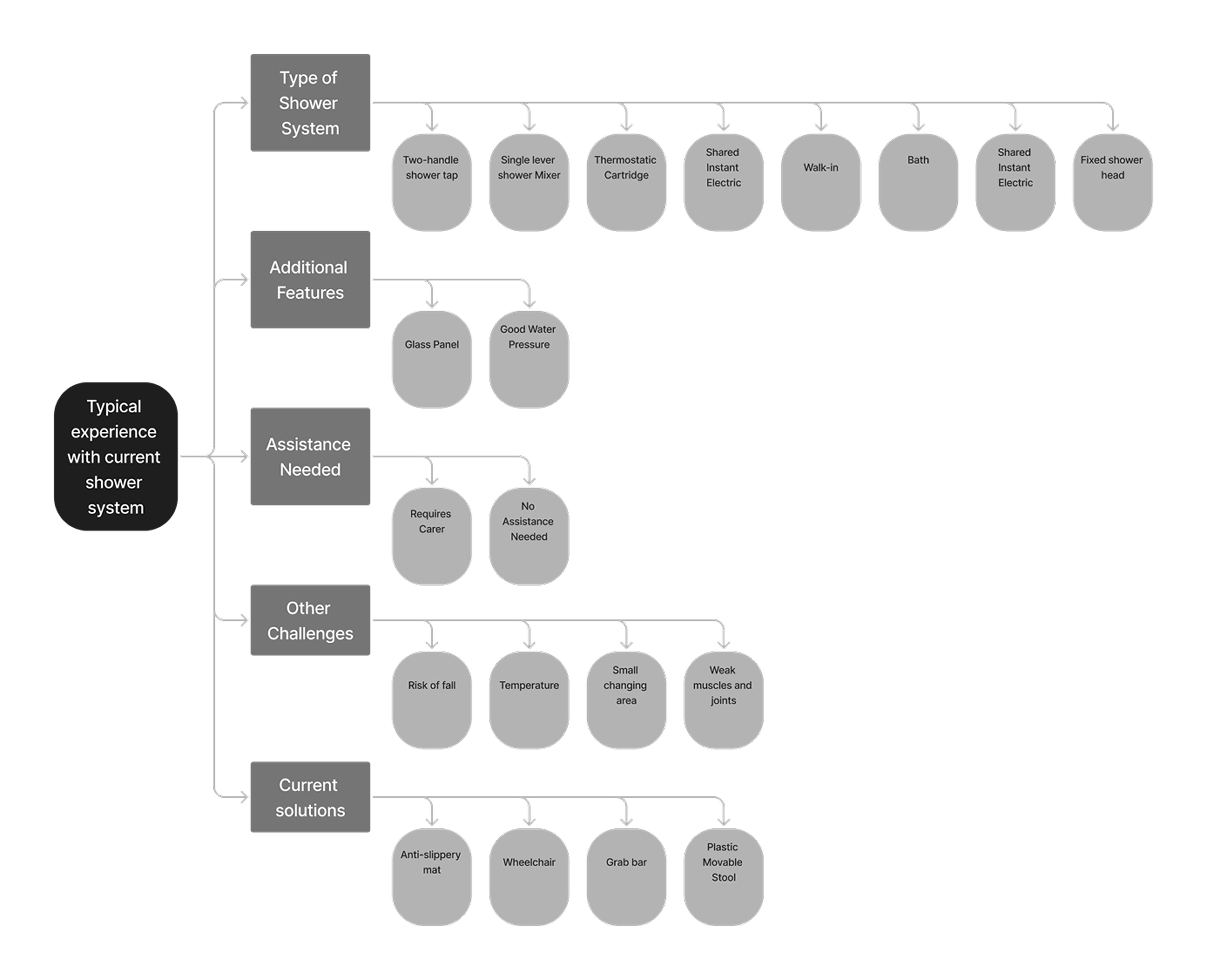
I thematically coded interviews to uncover recurring challenges and coping strategies
Key Insights → Design Decisions
- Physical Barriers: Falls, fatigue, and reach limitations were common → Drove larger tap targets and reachable interface layouts.
- Cognitive Factors: Memory lapses and fear of unfamiliar tech reduced adoption → Led to simplified navigation and clearer labelling.
- Interaction Preference: Touchscreens were consistently favoured → Prioritised touchscreen prototypes over voice/gesture.
- Safety Priority:Strong demand for safety locks and emergency functions → Added temperature lock and emergency stop features.
Prototype Develpoment & User Testing
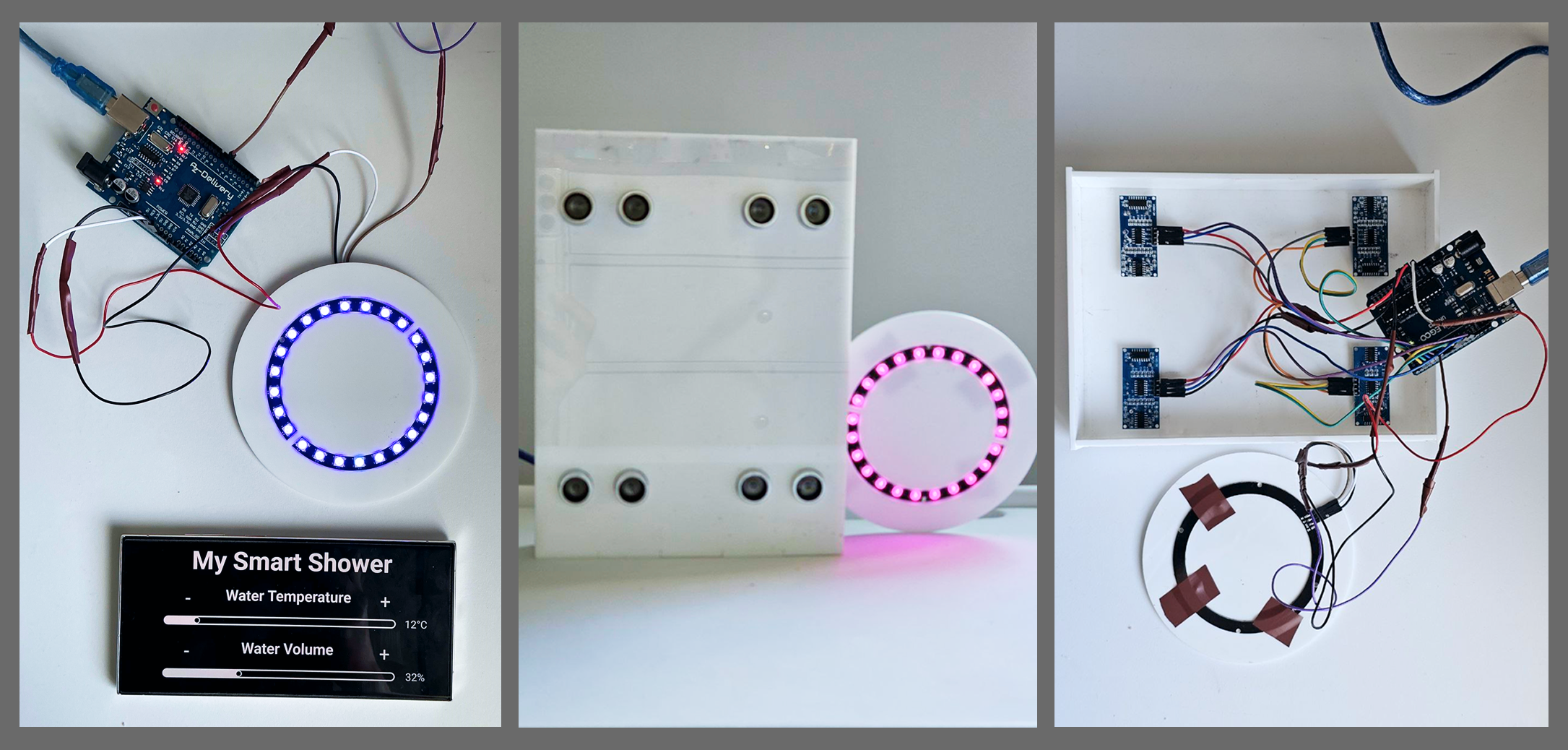
We built and tested three interaction prototypes — touchscreen, gesture, and voice; to evaluate which interface best supports older adults in completing shower tasks.
Key Results:
- Touchscreen → 83% task completion ✅
- Gesture → 50% ⚠️
- Voice command → 17% ❌
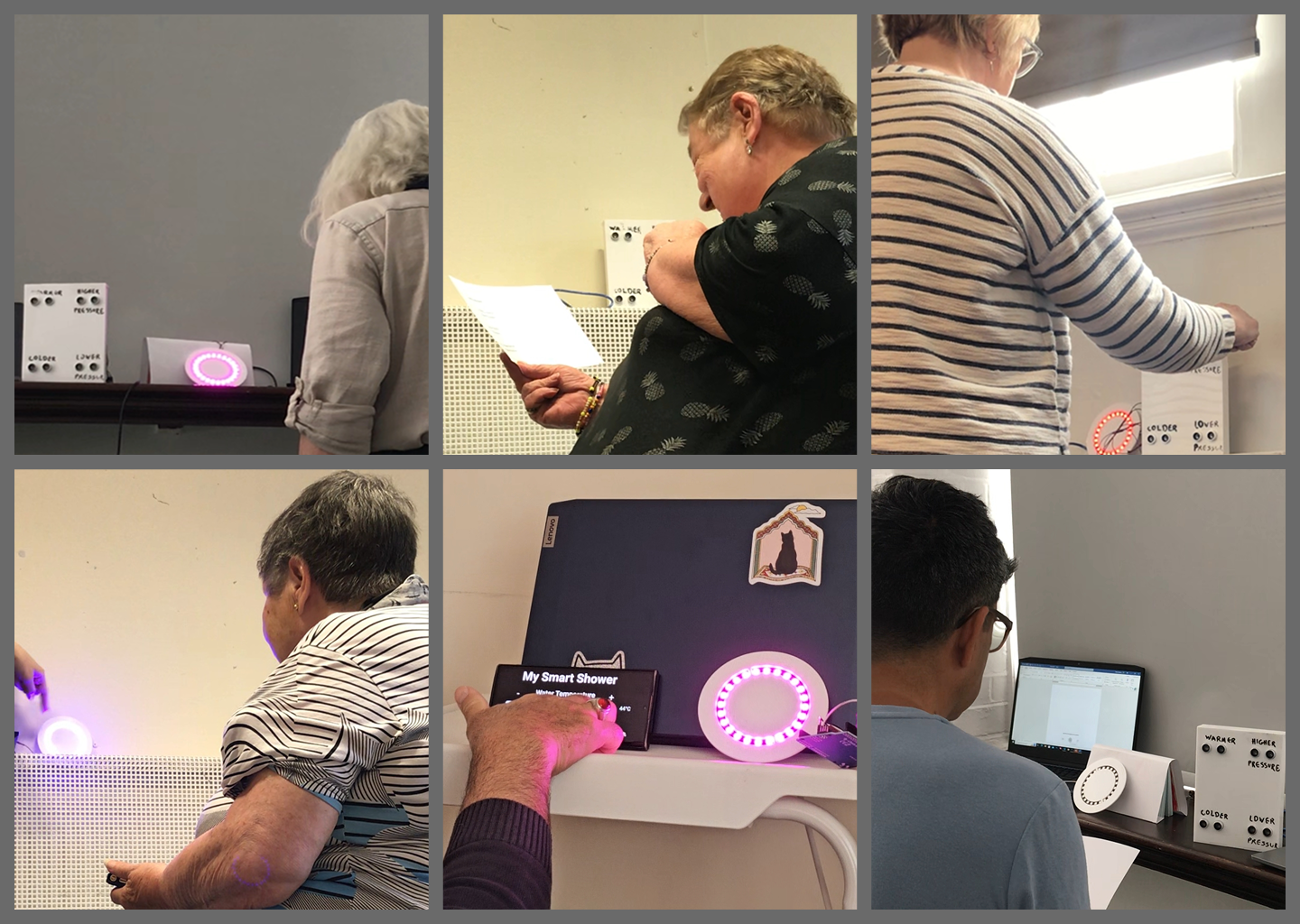
The results clearly demonstrated that a large touchscreen interface with simple sliders outperformed other methods, directly informing the second iteration.
Expert Evaluation:
Preliminary design guidelines were developed from user research and divided into two categories:
- Must-Have Features: Touchscreen interaction, large and simple interface, visual feedback, and essential safety functions
- Nice-to-Have Features: Customisable water outlets, light indicators for temperature and volume, smartphone app control, and personalised user profiles
The second touchscreen prototype and design guidelines were reviewed by 5 experts in UX design, industrial design, and mechanical engineering, providing validation and suggestions for refinement.
Design Iterations
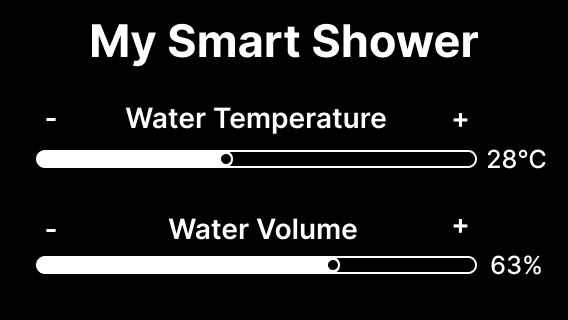
Iteration 1 – Mobile Prototype
- Designed at phone size
- Interaction targets too small for older adults
- Served as baseline for feedback
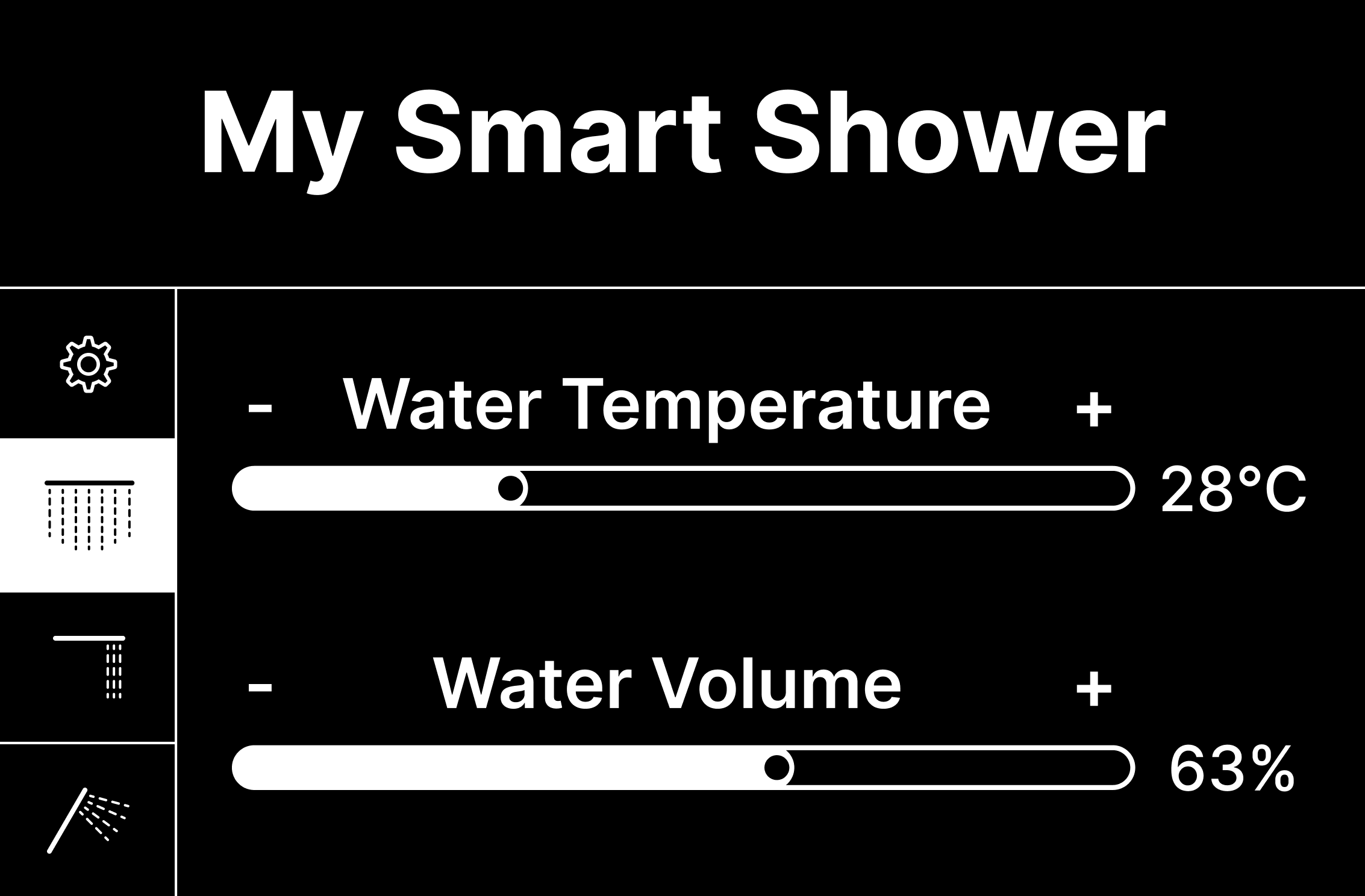
Iteration 2 – iPad Mini Redesign
- Enlarged sliders and text for readability
- Added option for water outlet selection
- Improved usability and prepared for expert review
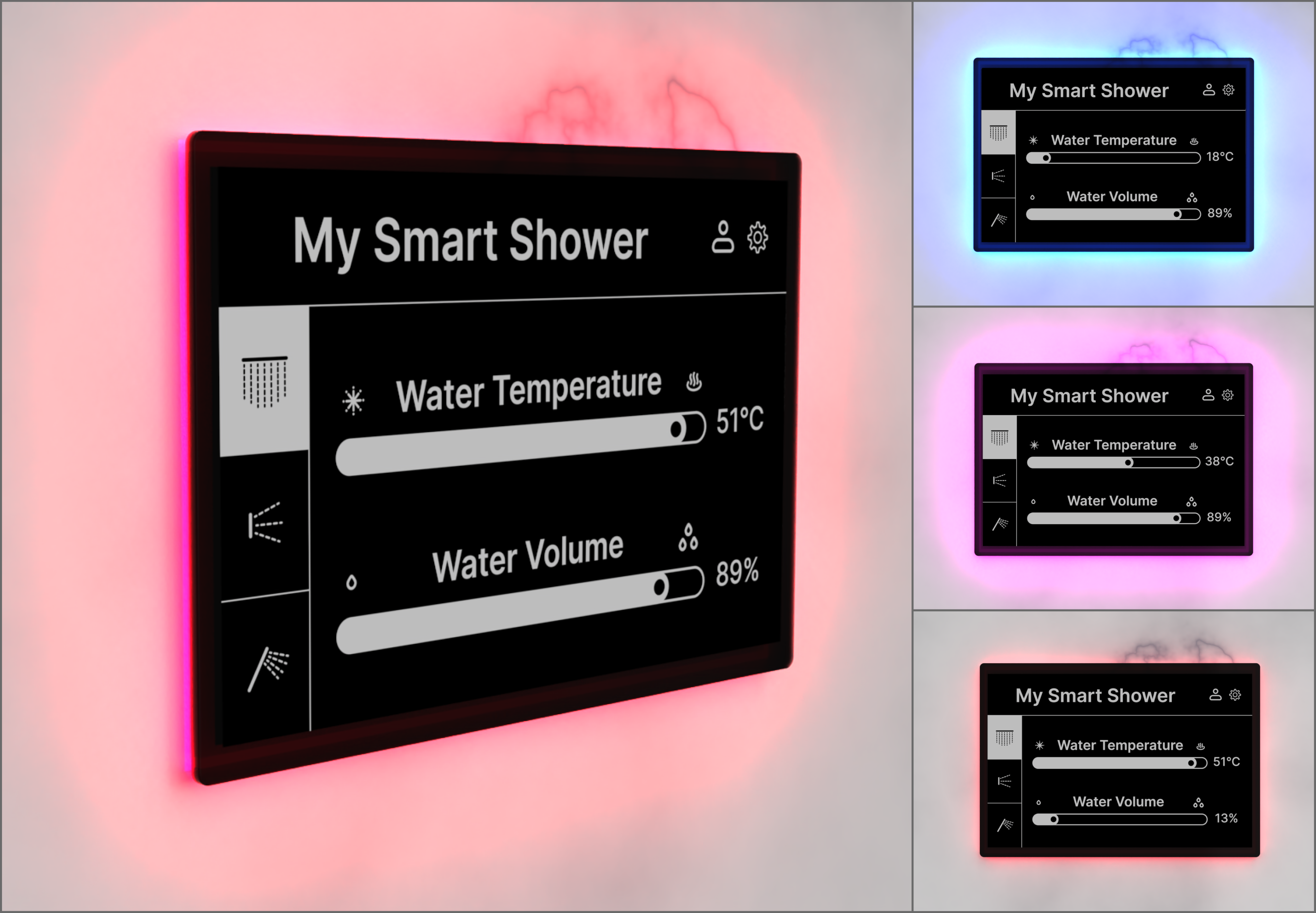
Iteration 3 – Expert Feedback Refinement
- Increased slider size for accuracy
- Clearer icons, smaller title, updated layout
- Added profile button for multi-user accessibility
Accessibility Guidelines for Smart Shower Systems
The following guidelines were shaped through user testing and expert validation. They highlight the essential ‘must-have’ features for accessibility and safety, as well as ‘nice-to-have’ enhancements for improving user satisfaction.
| Must-Have Features | Nice-to-Have Features |
|---|---|
| Touchscreen interaction | Customisable water outlet options |
| Large, high-contrast interface | Light indicators for temperature and volume |
| Visual and haptic feedback | Smartphone app remote control |
| Safety features (e.g. anti-scald, IP65 rating) | Personalised user profiles |
Detailed Example – Large, High-Contrast Interface
Participants with vision impairments reported difficulty reading small, low-contrast controls. Increasing font size, icon clarity, and colour contrast significantly improved task success rates and reduced error rates.
Impact & Applications
These guidelines provide a practical framework for designing accessible smart home interfaces, bridging research insights with real-world applications. This work translates user research and expert review into implementable rules for smart-shower UIs.
- For manufacturers: Touchscreen-first spec that achieved 83% task completion in testing and reduced errors versus gesture/voice. Patterns support high-contrast, large-target layouts for steamy, wet environments and align with IP65 hardware assumptions.
- For housing & care providers: Simpler controls that increase independence and reduce training burden.
- For product/design teams: Reusable UI patterns and states that accelerate delivery and standardise accessibility decisions.
Where to apply now
- New product UI for premium smart showers
- Retrofit control panels for existing installations
- White-label interface library across bathroom product lines
Next Steps
- Broaden validation: Re-test guidelines with 80-100 older adults (include arthritis, visual/hearing impairment).
- Coded proof-of-concept: Implement on a waterproof capacitive display to evaluate performance in steam and wet use.
- Critical interaction A/B: Compare slider vs stepped buttons for temperature/flow; measure time, error rate, confidence.
- Multimodal feedback spec: Add thresholds for haptic/LED/audio (luminance, dB) to signal state and safety.
- Pilot with manufacturer (4–6 weeks): Metrics-setup duration, completion %, error %, SUS, confidence.
- Implementation pack: Ship an annotated UI kit, accessibility checklist, and test scripts.
Outcome: A practical, expert-validated framework ready for a low-risk manufacturer pilot with clear success criteria.

